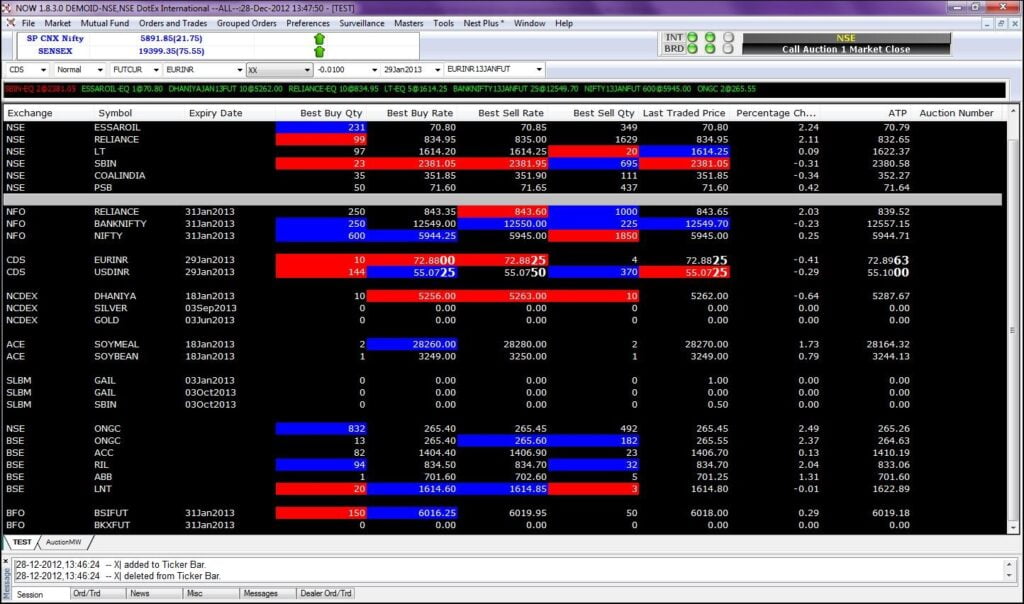If you’re a long-term investor or trader then you must have been following the action in the NSE’s 50 stocks (Nifty) index. Over the last few days, there has been considerable selling pressure on most Nifty Index constituents and that has made most investors panic-stricken. The movement of the Nifty has been especially challenging recently, with no real catalysts to support a recovery. Most analysts are of the view that if this continues beyond Friday, then we may be looking at a full-blown bear market in equities. However, when it comes to what traders should do on Friday afternoon, then opinions are divided. There are two schools of thought: Hold on to your portfolio and ride out the storm The first school of thought is that you should not rush to dump your holdings in the Nifty. If you are an investor with a long-term horizon and a big enough portfolio to ride out the storm, then you should continue to hold your stocks. You should not get emotional or try to time the market. You should only take a decision based on your portfolio’s long-term strategy. Over short-term, emotional decisions may not be in your interest. You should also not panic and sell all your stocks in the Nifty at one go. Instead, you should sell a few stocks, one after the other, based on your portfolio’s strategy. Dump your holdings immediately and stay out of market for good The second school of thought is that you should dump all your holdings and stay out of the market for good. If you are a short-term investor or trader, who’s looking to make quick bucks, then you should dump all your Nifty stocks and get out of the market immediately. If you have a short-term horizon, then you should not have invested in the Nifty stocks. You should have kept your money in cash. If you are someone who is serious about making quick money, then you should look to invest in a few stocks that have the potential to plummet by 50% in a few days. Once you have sold your holdings in the Nifty, you should move your money to cash or to a cryptocurrency. Should you short Nifty? The third school of thought is that you should short the Nifty and hope that the index crashes by 50%. If you like to make a quick buck, then you should short the stocks in the Nifty. If you are someone who believes that the market is going to crash by 50%, then you should short the stocks in the Nifty. You should only short a few stocks, one after the other, based on your strategy. When the shorting market is active, the margins you earn from shorting stocks are high. So, if you have a small portfolio of Nifty stocks, then you should short the stocks and hope that the index crashes by 50%. When to buy more stocks? The fourth school of thought is that you should buy more stocks in the Nifty on falling markets. If you are someone who believes that the market is going to crash, then you should buy more stocks in the Nifty. When we talk about investing in stocks, the most important task is to have a long-term view. So, when the market is trending down, you should buy more stocks in the Nifty. When the market is trending up, you should sell the stocks and move your money to cash. So, let me explain this with an example: A person has bought 10 stocks in the Nifty at Rs 1,000 per share, with an average cost of Rs 97.5 (Rs 1,000 / 10 = Rs 100). Let’s say, the market goes up and the Nifty shoots up to Rs 2,000 per share. The person who has bought stocks at Rs 1,000 per share would be happy and would feel that he/she got a rich return on his/her investment. However, a person who shorted the Nifty stocks at Rs 100 per share would feel that he/she made a quick buck. So, each investor should have a different strategy based on their investment objective and strategy. Conclusion The Nifty chart looks extremely scary and oversold. It seems that we may be on the verge of a full-blown bear market. However, when it comes to what traders should do on Friday, opinions are divided between those who believe that the market is going to crash by 50% and those who think that we are in a long-term bear market and should dump stocks immediately. So, which strategy should you follow? We believe that you should only have one strategy. You should have a long-term view and a short-term strategy. You should have a long-term investment strategy and a short-term trading strategy.









